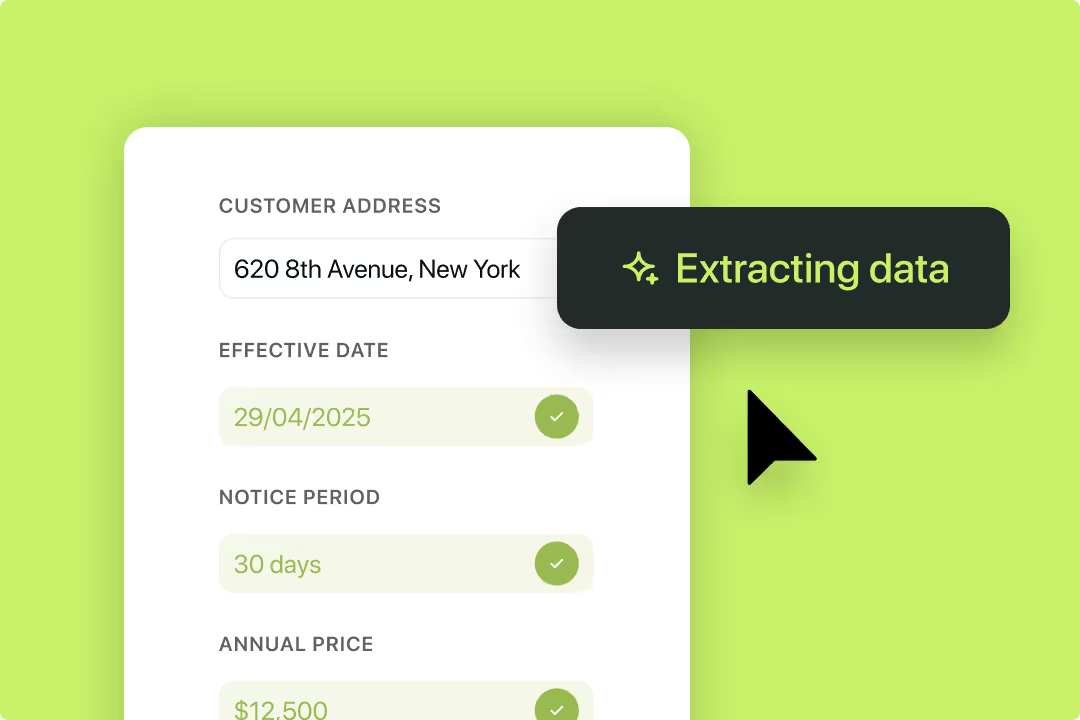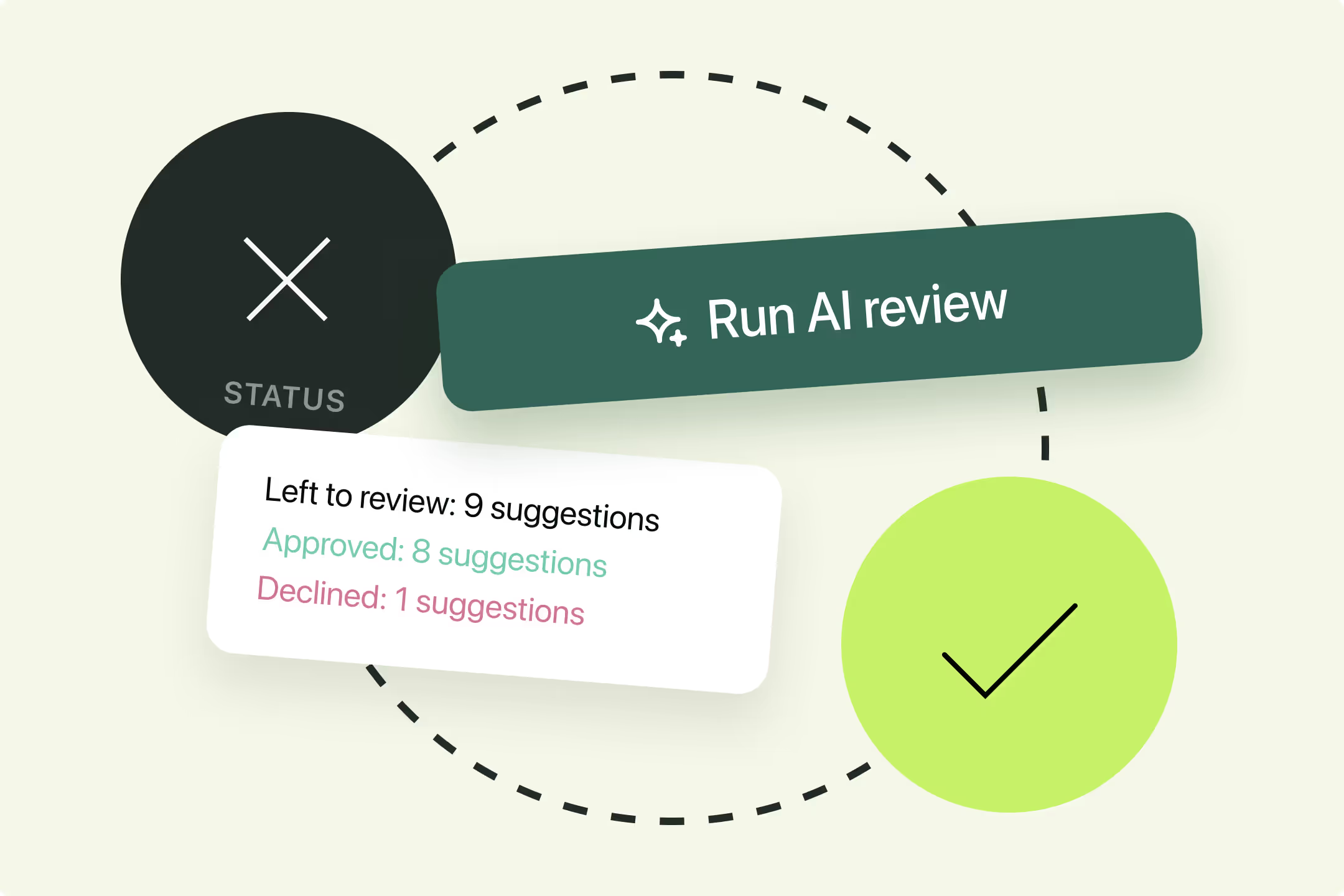Solutions
Customer Support
Resources
The contract renewal process still causes headaches for all kinds of business. Why? Because it’s easy to cut corners and skip best practices.
But don’t worry. Alongside our detailed guide on how to manage contract renewals, we’ve also pulled together ten best practices for renewing a contract. Check them out below. And if you’d like to automate reminders for your contracts, just hit the button below to get started.

These best practices will make sure you don’t get stung by contract renewals again - no matter the size of your business.
This best practice for managing a contract renewal is true of most stages of the contract lifecycle: don’t leave it too late.
Contract renewals can sneak up on you quickly without the right safeguards in place, often leaving you without enough time to weigh up your options and make the best (and most informed) decision for your business.
To avoid this scenario, it’s important to take a proactive approach to monitoring contracts. There are a few ways to do this, but conducting frequent reviews of your contracts can help, and as can adopting contract reminder software.

One common mistake that many contract managers and owners make is misunderstanding when the contract is actually up for renewal, or when it ends. This is because contracts typically contain a lot of legal jargon, and there are multiple dates can be listed in any one contract.
For example, lots of people get confused by renewal dates and termination dates, or effective dates and contract execution dates. Such a simple mistake can lead to missed renewals, which is far from ideal.
That’s why it’s important to tag and understand all of the information accurately, or adopt OCR-enabled contract management like Juro to automatically tag these contracts for you.
It can be tempting to file a contract away once executed and not look at it again until the renewal date nears. But ask yourself: does that put you in the best position for when the renewal date does arrive?
A key purpose of a contract is to formalize new relationships, and if you’re hoping to renew your contract, you’ll want these to pass the test of time. That’s why it’s valuable to nurture the relationship you have with the counterparty, as loyalty can be an important factor to consider when re-negotiating contract terms and deciding whether to renew.
The more satisfied both parties are with the relationship, the more likely they are to continue it for years to come.

Too often, legal teams operate in silos when it comes to renewing a contract. Unless the contract applies and affects the legal department exclusively, that shouldn’t be the case.
We’re big advocates of creating more collaborative contract workflows here at Juro, and we believe that this collaboration shouldn’t end once a contract’s been signed. When deciding whether or not to renew a contract, legal teams should consult any relevant stakeholders that might have an opinion on the decision.
This includes finance teams who may need to approve spending, the departments utilising the products or service being delivered, and any other departments involved in drafting the contract the first time round.
This helps to ensure all departments are satisfied with the decision, and that there are no nasty surprises.
Another contract management best practice is to know when your contracts will actually renew. It sounds obvious, but you’d be surprised how many legal and business teams forget to record renewal and termination dates once a contract’s been signed.
Even if they are recorded, some businesses still make the mistake of recording them in different places. This makes them difficult to find and near impossible to track.
Our advice is to record all of the renewal dates in one central location. For businesses early in their growth this might mean tracking them on an excel spreadsheet. Meanwhile, more mature businesses might have the luxury of using a contract repository.
Regardless of how you choose to approach it, what matters is that these deadlines are recorded and can be accessed with ease.

This contract renewal best practice is likely the most useful of all: setting contract renewal reminders.
Recording contract renewal dates is a good start, but how will you actually remember when they are approaching? Of course, you can review your spreadsheet or repository daily for upcoming deadlines, but this is both time-consuming and unnecessary.
Nowadays, contract management software means that legal and business teams can receive automated contract reminders when deadlines are on the horizon.
While it’s certainly more convenient to remain with the same provider and renew your contract, it’s not always advantageous to do so.
Since you last signed the contract, it’s possible that new vendors have entered the field, or more attractive propositions may have become available. To ensure you’re not missing out, it’s worth evaluating what alternatives are available to you to see whether entering a new contract with someone else might benefit you more than simply renewing your existing one.
This should be done well in advance of your contract renewal date, particularly if it takes a long time to adopt or onboard with a new product or service.
For more on that, check out our vendor management guide.
It’s common for people to assume that they have two options when approaching a contract renewal: renew the existing contract or don’t. But there’s also a third option, and that involves re-negotiating the terms before renewing the contract.
If the existing contract terms don’t serve you as well as you’d like, you don’t just have to grin and bear them. Why not try to change them? We’ve got some tips on how to approach this in our guides to contract negotiation and amending a contract.
However, the key is to understand exactly what you’re willing to accept from a renewed contract and to be fair with your requests.

This is generally well-received by counterparties when they’ve been given an ultimatum on whether to keep your custom or not. After all, continuing relationships with existing customers is often far cheaper than acquiring new customers.
Another important best practice for contract renewals is to know how to leave if you don’t decide to renew. Some business contracts will include an automatic renewal clause, meaning that inaction will leave you trapped within the contract for another term.
If this is the case for your contract, you’ll need to know how to provide notice of your decision not to renew it. Each contract or terms sheet will outline exactly how this needs to be done in order to be valid, so it’s important to familiarise yourself with this process ahead of time.
This is particularly important where there’s a lengthy notice period involved.
Last but not least, put a standardized procedure in place for renewing agreements. It’s all good and well ensuring that certain contracts are renewed successfully, but if the process isn’t repeatable, your business will continue to lose out.
Once you’ve established a process for managing renewals, you should document this in a contract playbook, or communicate it clearly to all of the relevant parties to ensure adoption. Juro is an excellent tool for automating these rules and conditions:
{{quote1}}
If recording contract renewal dates and managing renewals is a pain point for your team, Juro can help. Juro’s contract automation software captures all of the dates stored within your contract automatically, with automated contract reminders to ensure you never miss another renewal again. Fill in the form below to find out more.
Lorem ipsum dolor sit amet, consectetur adipiscing elit. Suspendisse varius enim in eros elementum tristique. Duis cursus, mi quis viverra ornare, eros dolor interdum nulla, ut commodo diam libero vitae erat. Aenean faucibus nibh et justo cursus id rutrum lorem imperdiet. Nunc ut sem vitae risus tristique posuere.

